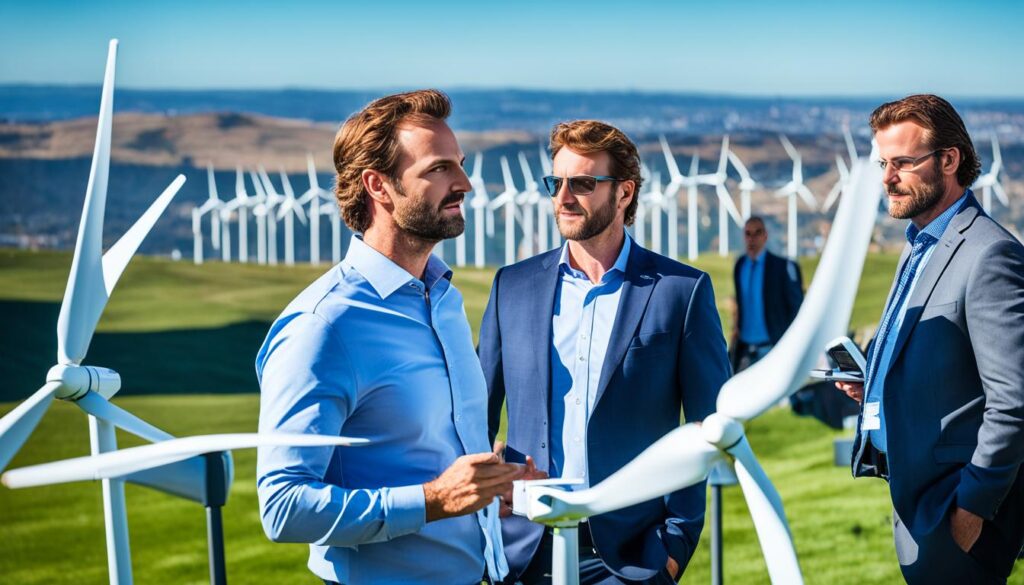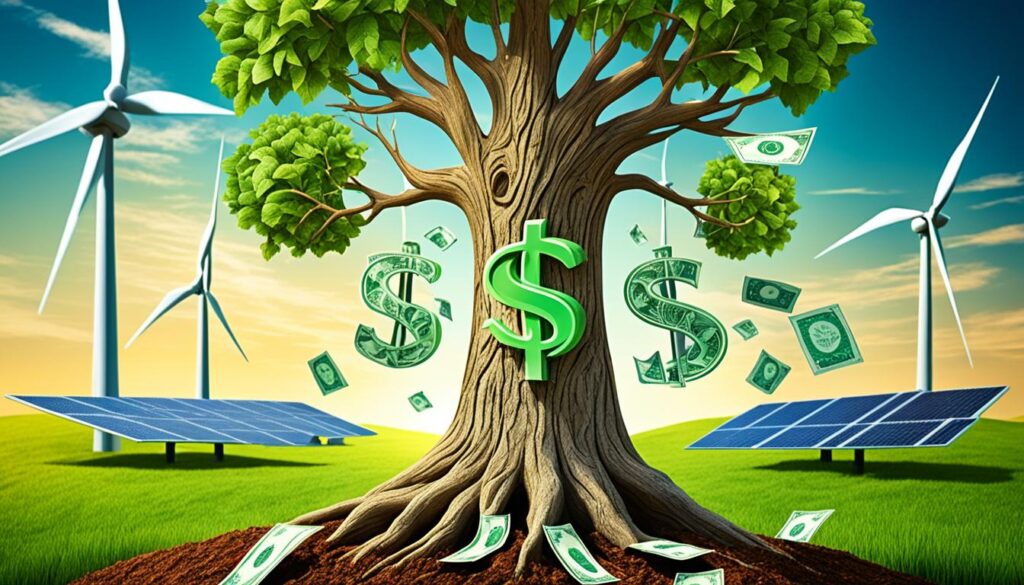As the urgency to address environmental challenges intensifies, I can’t help but wonder: What impact is climate change having on venture capital investment strategies? It’s a critical question that is reshaping the way investors navigate the rapidly evolving landscape of sustainable finance.
The impact of climate change on venture capital investment strategies has become a focal point for investors seeking to align their portfolios with the growing need for sustainable solutions. Venture capitalists are increasingly shifting their focus towards funding innovative startups that have the potential to mitigate the effects of climate change and drive sustainable economic growth. This article will explore the key ways in which climate change is transforming venture capital investment strategies, from the rise of ESG (Environmental, Social, and Governance) investing to the growing emphasis on renewable energy and climate tech startups.
Key Takeaways
- Venture capitalists are placing greater emphasis on sustainable investing, funding startups that address climate change.
- ESG (Environmental, Social, and Governance) factors are becoming increasingly integrated into investment decision-making.
- The venture capital industry is directing more resources towards renewable energy, clean technology, and other climate-focused solutions.
- Venture capitalists are evaluating the carbon footprint and environmental impact of potential investments.
- Collaboration with governments, non-profits, and other stakeholders is driving innovation in the climate tech sector.
Introduction: Acknowledging the Shift in Investment Priorities
The growing urgency of climate change has led to a significant shift in investment priorities across the financial sector, including the venture capital industry. As the impacts of climate change become more pronounced, venture capitalists are recognizing the importance of aligning their investment strategies with the pressing need to address environmental challenges.
The Growing Urgency of Climate Change
The scientific evidence is clear: climate change is one of the most pressing issues facing our world today. Rising temperatures, more frequent and severe natural disasters, and the depletion of natural resources are just a few of the dire consequences we must confront. This growing urgency has prompted a fundamental shift in the way investors, including venture capitalists, approach their investment decisions.
Venture Capital’s Role in Driving Sustainable Solutions
As the impacts of climate change become more pronounced, venture capital firms are playing a crucial role in channeling funding towards sustainable solutions that have the potential to mitigate the effects of global warming and promote a more environmentally conscious future. Venture capitalists, who have traditionally been at the forefront of funding innovative startups and disruptive technologies, are now increasingly recognizing the importance of supporting climate-focused ventures that are developing cutting-edge solutions to address the world’s most pressing environmental challenges.

What Impact is Climate Change Having on Venture Capital Investment Strategies?
The impact of climate change on venture capital investment strategies is profound. Venture capitalists are increasingly recognizing the immense potential of renewable energy and clean technology startups to drive meaningful change and provide viable alternatives to traditional, carbon-intensive industries.
Increased Focus on Renewable Energy and Clean Tech Startups
Venture capitalists are now channeling more resources towards funding innovative solutions in the renewable energy and clean technology sectors. They are actively seeking out startups that are developing cutting-edge technologies in areas such as solar, wind, energy storage, and sustainable transportation. This shift reflects the venture capital industry’s commitment to supporting the development and scaling of solutions that can help address the challenges posed by climate change.
Emphasis on Sustainable Business Models and Practices
Alongside the increased focus on renewable energy and clean tech startups, there is a growing emphasis on sustainable business models and practices within the venture capital industry. Venture capitalists are now more selective in their investment decisions, prioritizing companies that not only have the potential to generate strong financial returns but also demonstrate a commitment to environmental sustainability and responsible corporate governance. This shift in focus underscores the venture capital industry’s recognition of the importance of aligning investment strategies with the broader goal of promoting a low-carbon, environmentally conscious future.

The Rise of ESG Investing and Climate Tech Funds
Alongside the increased focus on renewable energy and clean technology startups, the venture capital industry has seen a surge in the prominence of ESG (Environmental, Social, and Governance) investing and the emergence of dedicated climate tech funds. Venture capitalists are now more actively integrating ESG factors into their investment decision-making processes, ensuring that the companies they fund not only have strong financial potential but also demonstrate a commitment to sustainable practices and responsible corporate governance.
Integrating Environmental, Social, and Governance Factors
By considering ESG criteria, venture capitalists are able to identify companies that not only generate robust financial returns but also have a positive impact on the environment and society. This holistic approach to investment analysis has become increasingly important as investors and consumers alike demand greater accountability and transparency from the companies they support.
Funding Innovations in Climate Mitigation and Adaptation
The establishment of specialized climate tech funds has enabled venture capitalists to channel their resources towards innovations in climate mitigation and adaptation. These funds focus on backing startups that are developing cutting-edge technologies, such as carbon capture and storage solutions, resilient infrastructure, and advanced energy storage systems, which have the potential to significantly reduce greenhouse gas emissions and help communities adapt to the changing climate.

Assessing and Mitigating Climate-Related Risks
As the impacts of climate change become increasingly prevalent, venture capitalists are placing greater emphasis on carefully assessing and mitigating the climate-related risks associated with their investment decisions. This diligent approach involves thoroughly evaluating the carbon footprints and overall environmental impact of the startups they consider funding, ensuring that their investments align with the broader goal of reducing greenhouse gas emissions and promoting sustainable practices.
Evaluating Carbon Footprints and Environmental Impact
By conducting comprehensive risk assessments, venture capitalists can make more informed and strategic investment choices. They carefully analyze the operational efficiency, energy consumption, and waste management practices of potential portfolio companies, with the aim of supporting startups that are actively working to minimize their environmental footprint and contribute to the transition towards a low-carbon economy.
| Key Factors Evaluated | Objectives |
|---|---|
| Carbon Emissions | Assess the startup’s direct and indirect greenhouse gas emissions and identify opportunities for reduction. |
| Energy Efficiency | Evaluate the startup’s use of renewable energy sources and energy-efficient technologies. |
| Resource Utilization | Analyze the startup’s water usage, waste management practices, and circular economy initiatives. |
| Environmental Impact | Assess the startup’s overall impact on the environment, including its effects on biodiversity, land use, and ecosystem preservation. |
By prioritizing climate-conscious investments and supporting startups that demonstrate a strong commitment to sustainable practices, venture capitalists can play a pivotal role in shaping a future that is more resilient and environmentally responsible.

Investing in Green Infrastructure and Resilient Communities
As the urgency of addressing climate change intensifies, venture capital investment strategies are evolving to include a heightened focus on funding green infrastructure and resilient community development projects. Recognizing the critical role that sustainable urban planning and infrastructure can play in mitigating the impacts of climate change, venture capitalists are channeling resources towards startups and initiatives that are driving innovations in areas such as renewable energy, energy-efficient buildings, and climate-resilient transportation systems.
Supporting Sustainable Urban Development
Venture capitalists are increasingly prioritizing investments in startups that are spearheading the development of sustainable urban infrastructure. From pioneering renewable energy solutions for residential and commercial buildings to innovative mobility technologies that reduce carbon emissions, these ventures are poised to transform the way we design and build our cities. By supporting these initiatives, venture capitalists are contributing to the creation of more livable, environmentally conscious communities that can withstand the challenges posed by climate change.
Financing Adaptation Measures for Vulnerable Regions
In addition to their focus on sustainable urban development, venture capitalists are also prioritizing investments in adaptation measures for vulnerable regions. As the effects of climate change continue to manifest through extreme weather events and rising sea levels, venture capital firms are directing funding towards the development of solutions that can help communities prepare for and respond to these challenges. From resilient infrastructure projects to innovative early warning systems, these investments are aimed at enhancing the resilience of communities most at risk from the impacts of climate change.

The Role of Public-Private Partnerships
As the venture capital industry’s focus on climate change continues to evolve, the role of public-private partnerships has become increasingly crucial. Venture capitalists are recognizing the immense value in collaborating with government agencies, non-profit organizations, and other key stakeholders to address the complex environmental challenges we face.
Collaborating with Governments and Non-Profits
By forging strategic partnerships with government entities and non-profit organizations, venture capitalists can leverage their collective expertise, resources, and policy influence to drive meaningful change. These collaborations enable venture capitalists to navigate the intricate regulatory landscapes, access additional funding sources, and support the development and scaling of innovative climate solutions that have the potential for wide-reaching impact.
Leveraging Policy Incentives and Regulatory Frameworks
Venture capitalists are also recognizing the importance of aligning their investment strategies with the evolving policy incentives and regulatory frameworks that are shaping the climate tech sector. By partnering with policymakers and regulatory bodies, they can stay ahead of the curve, identify emerging opportunities, and ensure that their investments are positioned to take advantage of the shifting landscape. This collaborative approach allows venture capitalists to maximize the impact of their climate-focused investments and contribute to the broader transition towards a more sustainable future.

Challenges and Opportunities in Climate-Conscious Investing
As the venture capital industry embraces a more climate-conscious approach to investing, it faces a unique set of challenges and opportunities. Navigating the rapidly evolving regulatory landscape and dynamic market conditions is crucial for venture capitalists seeking to capitalize on the immense potential of climate-focused investments.
Navigating Regulatory Landscapes and Market Dynamics
The climate tech sector is subject to a complex and ever-changing regulatory environment, as governments around the world implement policies and incentives to drive the transition towards a low-carbon economy. Venture capitalists must stay abreast of these developments, adapting their investment strategies to align with the shifting regulatory frameworks and leveraging policy tools to support the growth of their portfolio companies. Additionally, the climate tech market is characterized by rapid technological advancements, shifting consumer preferences, and evolving industry dynamics, requiring venture capitalists to maintain a keen understanding of the market and remain agile in their decision-making.
Balancing Financial Returns with Environmental Impact
One of the primary challenges faced by venture capitalists in the climate-conscious investing landscape is the need to strike a balance between generating robust financial returns and driving meaningful environmental impact. While the potential for lucrative returns in the climate tech sector is significant, as evidenced by the increasing valuation-to-revenue multiples, venture capitalists must also ensure that their investments contribute to the broader goal of mitigating climate change. This delicate balancing act requires a deep understanding of the trade-offs involved and a willingness to prioritize sustainable solutions that may not always align with traditional investment metrics.

By navigating these challenges and capitalizing on the opportunities presented by climate-conscious investing, venture capitalists can play a pivotal role in driving the transition towards a more sustainable and resilient future. Through their strategic investments, they can support the development and scaling of innovative climate solutions that not only generate financial returns but also contribute to the broader societal goal of mitigating the effects of climate change.
Success Stories and Innovative Climate Tech Ventures
The venture capital industry’s increasing focus on climate change has already yielded several inspiring success stories, with innovative climate tech startups securing significant funding and making tangible progress in addressing environmental challenges. These groundbreaking ventures are showcasing the tremendous potential of climate-conscious investments and the transformative impact they can have on our planet.
Highlighting Groundbreaking Startups and Their Impact
One shining example is Sunrun, a leading residential solar energy company that has revolutionized the way we power our homes. With the support of venture capital funding, Sunrun has made solar energy more accessible and affordable for millions of homeowners, helping to reduce their carbon footprint and contribute to a cleaner, more sustainable future.
Another success story is Proterra, a pioneering electric vehicle (EV) manufacturer that is driving the transition towards zero-emission transportation. Backed by venture capital investments, Proterra has developed advanced electric buses and charging infrastructure, enabling cities and municipalities to transition their public transit fleets to clean, efficient, and environmentally friendly mobility solutions.
These are just a few of the many groundbreaking climate tech startups that are capturing the attention of venture capitalists. By highlighting these success stories, I can inspire further innovation, encourage investment in the climate tech sector, and demonstrate the positive impact that can be achieved through a strategic, climate-conscious approach to venture capital.
| Startup | Focus Area | Key Achievements | Venture Capital Funding |
|---|---|---|---|
| Sunrun | Residential Solar Energy | Installed over 1 million solar energy systems, reducing CO2 emissions by over 5 million metric tons | $3.2 billion in venture capital funding from investors such as Sequoia Capital, Accel, and Kleiner Perkins |
| Proterra | Electric Vehicles and Charging Infrastructure | Deployed over 1,000 zero-emission electric buses across North America, offsetting over 100 million gallons of diesel fuel | $1.2 billion in venture capital funding from investors including Daimler, Kleiner Perkins, and Generation Investment Management |
| Impossible Foods | Plant-Based Meat Alternatives | Developed a plant-based burger that closely mimics the taste and texture of traditional beef, reducing the environmental impact of meat consumption | $1.5 billion in venture capital funding from investors such as Khosla Ventures, Bill Gates, and Horizons Ventures |

The Future of Climate-Focused Venture Capital Investing
As the world continues to grapple with the pressing issue of climate change, the future of venture capital investing is expected to become increasingly climate-focused. Venture capitalists will likely continue to identify and fund emerging trends and disruptive technologies that have the potential to revolutionize the way we approach environmental sustainability.
Emerging Trends and Disruptive Technologies
This may include innovations in areas such as carbon capture and storage, advanced biofuels, smart grid technologies, and next-generation renewable energy solutions. These cutting-edge technologies hold the promise of transforming the way we generate, distribute, and consume energy, ultimately paving the way for a more sustainable future.
The Role of Venture Capital in Driving Systemic Change
Moreover, the venture capital industry will play a pivotal role in driving systemic change, supporting the development and scaling of comprehensive climate solutions that can create lasting, positive impacts on a global scale. By aligning their investment strategies with the urgent need to address climate change, venture capitalists can contribute to the transition towards a more sustainable and resilient future.

Conclusion: Embracing a Sustainable Investment Mindset
In conclusion, the impact of climate change on venture capital investment strategies is undeniable. As the urgency to address environmental challenges intensifies, I am recognizing the critical importance of aligning my investment decisions with the goal of promoting sustainable solutions and mitigating the effects of global warming.
From the rise of ESG investing and climate tech funds to the increased focus on renewable energy and resilient infrastructure, the venture capital industry is playing a pivotal role in driving the transition towards a low-carbon, environmentally conscious future. By embracing a sustainable investment mindset and continuing to support innovative startups that are tackling the world’s most pressing environmental issues, I can contribute to creating a more resilient and prosperous global economy.
As I look to the future, I am excited to be part of this transformative journey, where venture capitalists like myself have the opportunity to make a tangible difference in the fight against climate change. By channeling our resources towards impactful, climate-focused investments, we can drive meaningful change and pave the way for a more sustainable and prosperous tomorrow.
